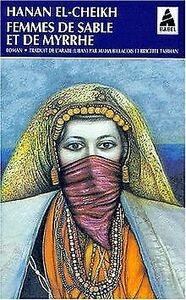You need to sign in or sign up before continuing.
Take a photo of a barcode or cover
I was disappointed with this read, as it promised do much. I was interested in life in the desert, but it was written and translated in a very dispassionate way, which made the four women seem somewhat flat.
This book was interesting, but not so engaging that I couldn't put it down. This became problematic because the narratives of the characters often read the same way and I had difficulty keeping track of their stories. Additionally, I thought the prose related to the Ex-pat woman was clearly an Arab writing about her impression of Americans, rather than an American writing about her impression of Arabs, as was intended.
I read an article titled "Gender, Genre, and the (Missing) Gazelle: Arab Women Writers and the Politics of Translation," after I finished this book. This article was suggested by another Goodreads reviewer, and I really appreciate it.
While I rate the English translation 3 stars at most, I learned that significant changes were made from the Arabic, ranging from the title to order of the four narratives. After reading through the changes, I feel it is quite possible I would rate the original work higher, as the rearranging significantly changes the meaning and weight of the stories.
All that to say, if you read the translation, try to read the article for a better understanding of the author's purpose.
While I rate the English translation 3 stars at most, I learned that significant changes were made from the Arabic, ranging from the title to order of the four narratives. After reading through the changes, I feel it is quite possible I would rate the original work higher, as the rearranging significantly changes the meaning and weight of the stories.
All that to say, if you read the translation, try to read the article for a better understanding of the author's purpose.
I wanted to like this book much more than I did. Conceptually, it’s great. However, one must wade through very murky and ambiguous prose to figure out exactly what the author is attempting to convey, and I often found that my efforts were not worth the cliche.
challenging
informative
slow-paced
Strong character development:
Complicated
Loveable characters:
No
Diverse cast of characters:
Yes
Flaws of characters a main focus:
Complicated
An interesting window onto the restricted lives of women living in the Arabian Gulf, though as with its subject, the view is constrained.
Each section is written from a first-person account of one of four different women: two natives, and two expatriates, one Lebanese and one American. The constraints on women in the culture makes for very insular lives, and the narrative structure is even more restrictive: we’re privy only to their perspectives and the stories that are told by other women they encounter, and they rarely leave their homes. The result is a novel that feels more like a series of interviews, with little in the way of narrative.
Since these women all interact with each other, it’s a curious choice. I’m sure the narrative claustrophobia is intentional, but it can get tedious, especially in the case of Suzanne, who is such a stupid woman that being stuck with her for so long feels like torture. She could have worked in smaller doses.
Matters aren’t helped by the sense that the author has such contempt for most of these women, or at best contempt for what they’ve become under such circumstances. And because the writing is first person narrative, there are a few times where reading between the lines is difficult when the culture is so different from a Western perspective.
Still, the novel is interesting enough for me to seek out al-Shaykh’s other writing, like something set in her native Lebanon.
Each section is written from a first-person account of one of four different women: two natives, and two expatriates, one Lebanese and one American. The constraints on women in the culture makes for very insular lives, and the narrative structure is even more restrictive: we’re privy only to their perspectives and the stories that are told by other women they encounter, and they rarely leave their homes. The result is a novel that feels more like a series of interviews, with little in the way of narrative.
Since these women all interact with each other, it’s a curious choice. I’m sure the narrative claustrophobia is intentional, but it can get tedious, especially in the case of Suzanne, who is such a stupid woman that being stuck with her for so long feels like torture. She could have worked in smaller doses.
Matters aren’t helped by the sense that the author has such contempt for most of these women, or at best contempt for what they’ve become under such circumstances. And because the writing is first person narrative, there are a few times where reading between the lines is difficult when the culture is so different from a Western perspective.
Still, the novel is interesting enough for me to seek out al-Shaykh’s other writing, like something set in her native Lebanon.
challenging
dark
tense
slow-paced
Strong character development:
Complicated
Loveable characters:
No
Diverse cast of characters:
Yes
Flaws of characters a main focus:
Yes
The lives of four women intertwine in this unknown desert state somewhere in the middle-east. The author's colloquial use of language and metaphors gives the novel a post-modern feel. The author gives voices to four women from various socioeconomic classes. The issues addressed varies from what today's society would call archaic or pedantic; the contrasting nature of complexities the women face makes up the overarching arc. Understanding the clash of modernism and culture is these parts of the world is necessary for a better appreciation of the novel. The everyday stories of women isn't all that different and it somehow drastically is. Be it sexual diversity or economic freedom, women have to claw the walls to make a superficial dent let alone an everlasting one. With these struggles playing in the background, the author picks some and makes her characters face them.
I, we, need to understand; the superficiality of a narrative doesn't necessarily mean the issues don't exist. Its just that the characters have chosen not to play it in this space and time.
I, we, need to understand; the superficiality of a narrative doesn't necessarily mean the issues don't exist. Its just that the characters have chosen not to play it in this space and time.
Women exiled or expat or exhilarated in the desert Arab marriage culture of an unnamed gulf state, seeking refuge or escape and mostly still finding pain and mock-freedom.





